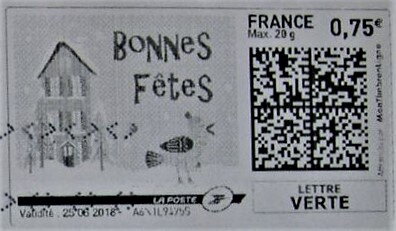Stamp: Happy Christmas, House, Bonnes Fetes (France 2018)
Happy Christmas, House, Bonnes Fetes (France 2018)
01 January (France ) within release MontimbrEnLigne. Celebrations goes into circulation Stamp Happy Christmas, House, Bonnes Fetes face value 0.75 Euro
| Stamp Happy Christmas, House, Bonnes Fetes in catalogues | |
|---|---|
| Colnect codes: | Col: FR-TIM 2018-248b |
Stamp is square format.
Also in the issue MontimbrEnLigne. Celebrations:
- Stamp - 2018 Chinese New Year of the Dog Type 3 face value 0.91;
- Stamp - Best Wishes 2. Meilleurs Voeux face value Lettre;
- Stamp - Big Thanks. Un Grand Merci 2 face value Ecopli;
- Stamp - Happy Christmas Panda Bonnes Fetes face value 0.70;
- Stamp - 2018 Chinese New Year of the Dog face value 3.04;
- Stamp - Happy Birthday Granny. Bonne Fete Mamie face value Lettre;
- Stamp - This letter is no joke. Ce Courrier n'est pas une Blague face value Lettre;
- Stamp - 2018 New Year, Owl in black face value 0.68;
- Stamp - Joyful Festival. Holly Leaves. Joyeuse Fetes face value Prioirtaire;
- Stamp - Big Thanks. Un Grand Merci 2 face value Suivie;
- Stamp - Happy Christmas, House, Bonnes Fetes face value 0.75;
- Stamp - Happy Christmas Panda Bonnes Fetes in black face value Lettre;
- Stamp - Seven red and green fir trees face value Lettre;
- Stamp - Munich Beer Festival. Oktober Fest face value Lettre;
- Stamp - New Year, Fox Bonne Annee in black face value Lettre;
- Stamp - Big Thanks. Un Grand Merci 2 face value Prioritaire;
- Stamp - Pas besoin de resolutions quand on est parfait face value Prioritaire;
- Stamp - 2018 Chinese New Year of the Dog Type 4 face value 1.24;
- Stamp - Happy Christmas Panda Bonnes Fetes in black face value 0.83;
- Stamp - Reindeer in black face value 0.74;
- Stamp - France 2018. White Background. Grey Stripes face value Ecopli;
- Stamp - Seven grey fir trees face value Lettre;
- Stamp - Festive Candy Stick in black face value Lettre;
- Stamp - Happy Christmas, House, Bonnes Fetes face value Prioritaire;
- Stamp - 2018 New Year, Owl in colour face value 0.70;
- Stamp - Happy New Year 2018 Bonne Annee face value 0.70;
- Stamp - 2018 Chinese New Year of the Dog Type 1 face value 0.73;
|
Data entry completed
46%
|
|
|---|---|
| Stamp Happy Christmas, House, Bonnes Fetes in digits | |
| Country: | France |
| Date: | 2018-01-01 |
| Emission: | Personalized - Official |
| Format: | Stamp |
| Face Value: | 0.75 Euro |
Stamp Happy Christmas, House, Bonnes Fetes it reflects the thematic directions:
Birds (Aves), a subgroup of Reptiles, are the last living examples of Dinosaurs. They are a group of endothermic vertebrates, characterised by feathers, toothless beaked jaws, the laying of hard-shelled eggs, a high metabolic rate, a four-chambered heart, and a strong yet lightweight skeleton. Birds live worldwide and range in size from the 5 cm (2 in) bee hummingbird to the 2.75 m (9 ft) ostrich. They rank as the class of tetrapods with the most living species, at approximately ten thousand, with more than half of these being passerines, sometimes known as perching birds. Birds are the closest living relatives of crocodilians.
Christmas or Christmas Day (Old English: Crīstesmæsse, meaning "Christ's Mass") is an annual festival commemorating the birth of Jesus Christ, observed most commonly on December 25 as a religious and cultural celebration among billions of people around the world. A feast central to the Christian liturgical year, it is prepared for by the season of Advent or the Nativity Fast and initiates the season of Christmastide, which historically in the West lasts twelve days and culminates on Twelfth Night; in some traditions, Christmastide includes an Octave. The traditional Christmas narrative, the Nativity of Jesus, delineated in the New Testament says that Jesus was born in Bethlehem, in accordance with messianic prophecies; when Joseph and Mary arrived in the city, the inn had no room and so they were offered a stable where the Christ Child was soon born, with angels proclaiming this news to shepherds who then disseminated the message furthermore. Christmas Day is a public holiday in many of the world's nations, is celebrated religiously by the vast majority of Christians, as well as culturally by a number of non-Christian people, and is an integral part of the holiday season, while some Christian groups reject the celebration. In several countries, celebrating Christmas Eve on December 24 has the main focus rather than December 25, with gift-giving and sharing a traditional meal with the family.
A house is a single-unit residential building. It may range in complexity from a rudimentary hut to a complex structure of wood, masonry, concrete or other material, outfitted with plumbing, electrical, and heating, ventilation, and air conditioning systems. Houses use a range of different roofing systems to keep precipitation such as rain from getting into the dwelling space. Houses generally have doors or locks to secure the dwelling space and protect its inhabitants and contents from burglars or other trespassers. Most conventional modern houses in Western cultures will contain one or more bedrooms and bathrooms, a kitchen or cooking area, and a living room. A house may have a separate dining room, or the eating area may be integrated into the kitchen or another room. Some large houses in North America have a recreation room. In traditional agriculture-oriented societies, domestic animals such as chickens or larger livestock (like cattle) may share part of the house with humans.



